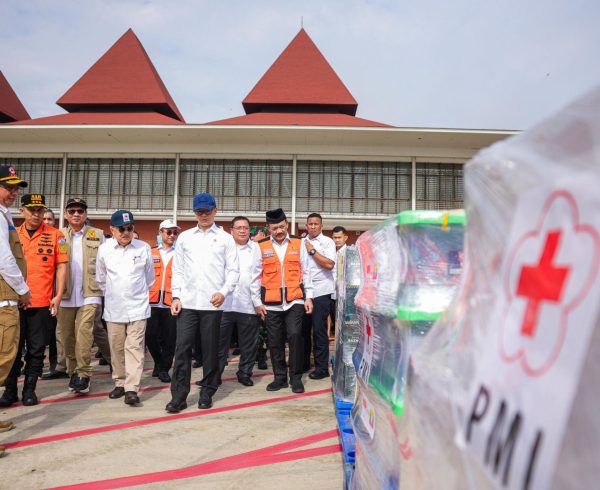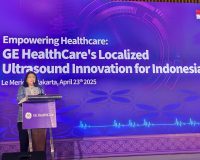Direktur Jenderal Kefarmasian dan Alat Kesehatan Kemenkes RI, L. Rizka Andalucia membuka secara resmi Focus Group Discussion (FGD) Ketersediaan Obat dengan Bahan Baku Garam Farmasi Produksi Dalam Negeri di Jakarta pada 7 Maret 2024.
Pertemuan ini bertujuan untuk menyediakan platform untuk membahas tantangan dan usulan solusi change source garam farmasi kepada industri farmasi di Indonesia dan memperoleh informasi kesiapan industri garam farmasi nasional untuk memenuhi kebutuhan garam farmasi di Indonesia serta menjamin ketersediaan obat untuk pelayanan kesehatan.
Mengundang narasumber dari Kementerian Perindustrian, Kementerian Koordinator Bidang Perekonomian, Badan Pengawas Obat dan Makanan (BPOM), Gabungan Perusahaan Farmasi Indonesia (GPFI) dan Kementerian Kesehatan, turut hadir perwakilan dari Kementerian Kelautan dan Perikanan, Kementerian Koordinator Bidang Kemaritiman dan Investasi, Kementerian Perdagangan, Lembaga National Single Window, Asosiasi Biofarmasi dan Bahan Baku Obat Indonesia (AB3O) serta para pelaku Industri Farmasi di Indonesia.
Garam farmasi merupakan garam yang memiliki kualitas yang paling tinggi dengan kadar NaCl >99,8%. Dalam industri farmasi, garam farmasi digunakan sebagai bahan baku untuk sediaan infus, produksi tablet, pelarut vaksin, sirup, oralit, cairan pencuci darah, minuman kesehatan, dan lain-lain.
Berdasarkan neraca komoditas tahun 2023, kebutuhan garam untuk industri farmasi sebesar 6.518 ton dan mayoritas dipenuhi dari garam farmasi impor. Sementara itu, Indonesia telah memiliki tiga produsen garam farmasi dengan total kapasitas sebesar 12.480 ton/tahun yang diharapkan dapat memenuhi seluruh kebutuhan garam farmasi dalam negeri demikian diungkapkan Direktur Jenderal Kefarmasian Dan Alat Kesehatan L. Rizka Andalusia saat membuka Focus Group Discussion.
“Penggunaan garam farmasi produksi dalam negeri memiliki tantangan tersendiri, seperti diperlukan waktu yang lama untuk melakukan uji coba penggunaan garam farmasi dalam negeri terutama pada uji stabilitas produk yang membutuhkan waktu sampai dua tahun. Oleh karena itu, diperlukan dukungan dari semua stakeholders dalam upaya pemenuhan sertifikasi pendaftaran produk jadi” tegas Rizka.
Lebih lanjut, Rizka menjelaskan bahwa paradigma ketahanan kesehatan juga telah dituangkan oleh pemerintah dan DPR dalam UU No. 17 Tahun 2023 tentang Kesehatan. Dalam Undang-undang tersebut mengamanatkan “Memastikan penggunaan bahan obat dan bahan baku alat kesehatan produksi dalam negeri oleh industri farmasi dan alat kesehatan dalam negeri”, tutur Rizka.
Oleh karena itu Kementerian Kesehatan senantiasa mendorong peningkatan penggunaan bahan baku obat (BBO) produk dalam negeri. “Walaupun demikian, kita perlu memprioritaskan tersedianya obat untuk pelayanan kesehatan. Kita harus hindari implementasi regulasi yang justru memicu potensi kekosongan obat, agar upaya membangun kemandirian tidak berdampak negatif bagi kesinambungan pelayanan kesehatan” tambah Rizka.
“Saya mendorong agar seluruh pihak dapat berkolaborasi untuk menjaga sinkronisasi produksi garam farmasi dalam negeri, untuk pemenuhan kebutuhan industri farmasi nasional” ajak Rizka.

Direktur Ketahanan Kefarmasian dan Alat Kesehatan, Roy Himawan diakhir diskusi mengajak Kementerian atau Lembaga bersama industri saling berkerjasama untuk mengembangkan inovasi dalam kebijakan fasilitasi riset dan pengembangan pemastian mutu dan akses pasar garam farmasi produksi dalam negeri. “Adalah tanggung jawab kita bersama untuk mendorong dan memfasilitasi penyediaan dan pemenuhan garam farmasi melalui produksi dalam negeri” pungkas Himawan


 Focus Group Discussion (FGD) Ketersediaan Obat dengan Bahan Baku Garam Farmasi Produksi Dalam Negeri di Jakarta pada 7 Maret 2024.
Focus Group Discussion (FGD) Ketersediaan Obat dengan Bahan Baku Garam Farmasi Produksi Dalam Negeri di Jakarta pada 7 Maret 2024.












